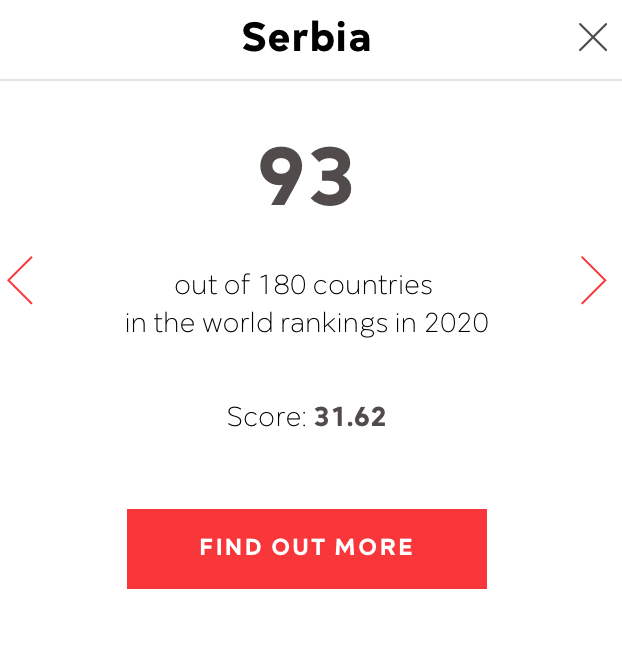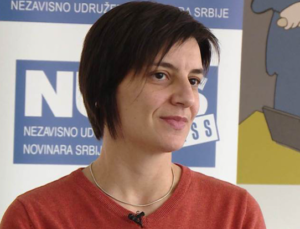
SERBIA – Ranked: 93 (- 3 places)
We talked to Tamara Filipovic-Stevanovic, project manager of the Independent Journalists’ Association of Serbia
 The drop of Serbia on the Reporters Without Borders ranking list does not surprise us. I can say that we expected an even worse position given the deteriorating levels of media freedoms and the safety of journalists in Serbia in the past year. Since 2016, together with its partners from the Regional Platform for advocating media freedom and journalists’ safety, IIndependent Journalists’ Association of Serbia (IJAS) annually conducts a research and publishes its findings in the report Indicators on the level of media freedom and journalists’ safety. Our 2019 report (to be published next month) provides valuable insight into the situation in Serbia and provides details that explain Serbia’s decline on the RSF list. It includes the following factors:
The drop of Serbia on the Reporters Without Borders ranking list does not surprise us. I can say that we expected an even worse position given the deteriorating levels of media freedoms and the safety of journalists in Serbia in the past year. Since 2016, together with its partners from the Regional Platform for advocating media freedom and journalists’ safety, IIndependent Journalists’ Association of Serbia (IJAS) annually conducts a research and publishes its findings in the report Indicators on the level of media freedom and journalists’ safety. Our 2019 report (to be published next month) provides valuable insight into the situation in Serbia and provides details that explain Serbia’s decline on the RSF list. It includes the following factors:
- Journalists are still physically endangered because of their work: After three years of having less than 10 physical assaults annually, in 2019 Serbia saw 11 assaults on journalists on duty
- Threats against the livesand limbs of journalists are constantly present and after a drop in 2018, last year their number was at the highest since 2015 – 23 threats against lives and limbs were recorded in our safejournalists.net database
- The number of different kinds of pressures journalists are facing is increasingannually: last year, IJAS recorded 80 such incidents (2018: 72, 2017: 62, 2016: 33)
- Impunity continues– cases of crimes against journalists rarely end up in court, they linger in pre-investigative and investigative proceedings, and verdicts are rare and have no deterring effect. Serbia still has two cases of murdered journalists that are still far from legal closure and one murder case (Slavko Curuvija) is slowly reaching it, yet masterminds behind it are still unknown.
- The case of arson, putting Milan Jovanovic house on fire is named in RSF report. IJAS has been monitoring this trial closely and reporting about it – it is a showcase of how poor the judiciary is, the accused used the trial to slander Jovanovic and threaten public prosecutors… In cooperation with Article 19 IJAS facilitates communication of updated information about this case to RAE Platform that connects to the four special rapporteurs on freedom of expression
- The incendiary rhetoriccoming from politicians and government officials directed at journalists reporting in the public interest is almost a norm, including the highest state officials: more than 30% of pressures recorded is exerted by them, and repeated in the pro-gov media thus creating an atmosphere in which violence against journalists is acceptable.
- Smear campaigns and disinformation and misinformationof the public in tabloid TV, print and online media are increasingly present. It is these media that have open support of the authorities in public statements, but also through state funds allocated to support production of media content of public interest and different types of contracts or tax benefits.
- Problems with access to informationof public interest continues: more institutions are closing to media and refusing to provide data
- The social and economic conditionsof work of journalists remain a significant problem, we can freely call them precarious workers, and union organisation is lacking.
However, there are reasons why the drop was not as drastic as we expected – Media Strategy was completed with the participation of all relevant actors. However, three years passed – a valuable time was lost for improving the working conditions of journalists and the media due to the irresponsibility of the state. The Strategy is a good starting document, but given the day-to-day behaviour of representatives of the state we are well afraid that it will remain on paper only as in Serbia strategic documents usually do. In addition, the Standing Working Group on raising journalists’ safety continued its work in 2019. Communication and the way cases are reported are the positive sides of the work of this group, but more needs to be done on the efficiency of case processing.
While Serbian president, Mr Vucic stated that it is his understanding that the reason for Serbia’s decline on the RSF list is the fact that there is still no verdict in the case of Milan Jovanovic whose house was put on fire in December 2018. Mr Vucic should read the report again, more carefully.